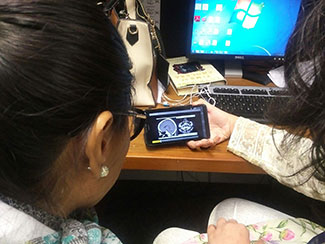Because of a lapse in government funding, the information on this website may not be up to date, transactions submitted via the website may not be processed, and the agency may not be able to respond to inquiries until appropriations are enacted. The NIH Clinical Center (the research hospital of NIH) is open. For more details about its operating status, please visit
cc.nih.gov. Updates regarding government operating status and resumption of normal operations can be found at
opm.gov.
Focus on NCDs: Customizing stroke prevention research in Pakistani population
November / December 2017 | Volume 16, Issue 6

Photo courtesy of Dr. Ayeesha Kamal
Fogarty funding has allowed Pakistani scientists to study
targeted approaches to prevent and treat stroke using text
messages and videos.
By Karin Zeitvogel
When Dr. Ayeesha Kamal returned to Pakistan in 2006 after completing stroke training in the U.S., she found that health care research in her country was still focusing on infectious illnesses - even though noncommunicable diseases (NCDs) were causing about half of all deaths.
So, in 2010, Kamal applied for a Fogarty Chronic, Noncommunicable Diseases and Disorders Across the Lifespan (NCD-Lifespan) grant and set up a three-year training fellowship at Aga Khan University. The grant was supported by the National Institute of Neurological Disorders and Stroke (NINDS) at NIH. The program - the first of its kind in the country - provided comprehensive training in the management of cerebrovascular diseases in a Pakistani context. Participants acquired the clinical skills needed to evaluate and manage stroke patients, and the cognitive skills to critically analyze evidence on stroke and its relevance to low- and middle-income countries (LMICs). A strong NCD research program "allows Pakistan to be proactive about stroke prevention, instead of reacting to one disaster after another," said Kamal.
One trainee devised a questionnaire to find out what puts Pakistanis under stress, a risk factor for hypertension, which is the leading cause of stroke. "We learned that something that triggers stress in the developed world - where many of these questionnaires are drafted - might not be relevant to Pakistanis," said Kamal. "For instance, going to the dentist is a stressor in the developed world but in Pakistan, it's a status symbol. Thanks to the questionnaire devised by our trainee, we can now ask questions that actually matter here."
Fogarty-supported trainees also developed mobile phone videos that explain how to care for stroke victims, and a text message application aimed at improving patients' adherence to medication. Graduates of the program have set up stroke centers in Pakistan, and taken positions as researchers at local and international universities.
"Too often, researchers get carried away with the high-tech stuff that might benefit 5 percent of the global population, usually in the developed world," said Kamal. "The work that Fogarty funds has meaning for 95 percent of the world."
More Information
To view Adobe PDF files,
download current, free accessible plug-ins from Adobe's website.